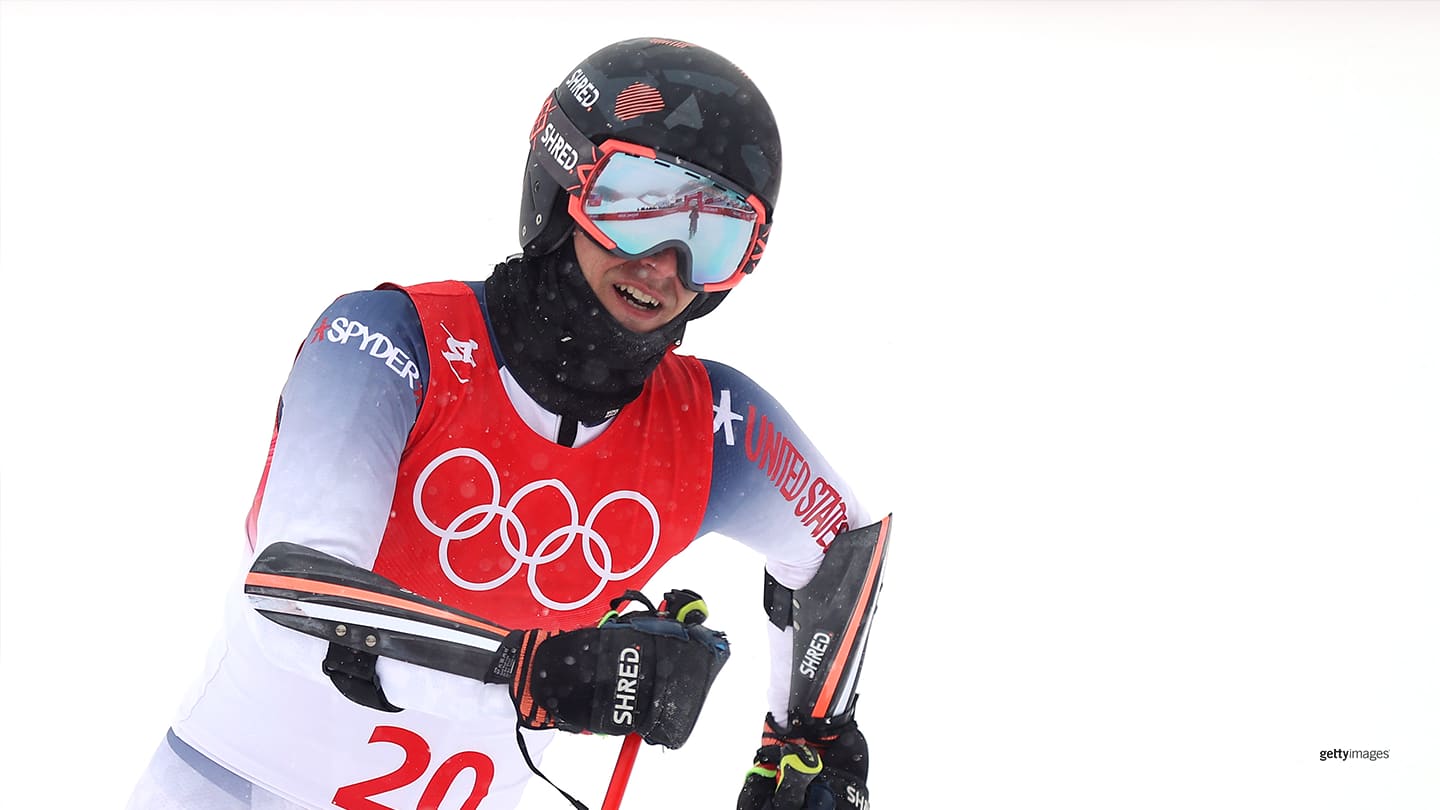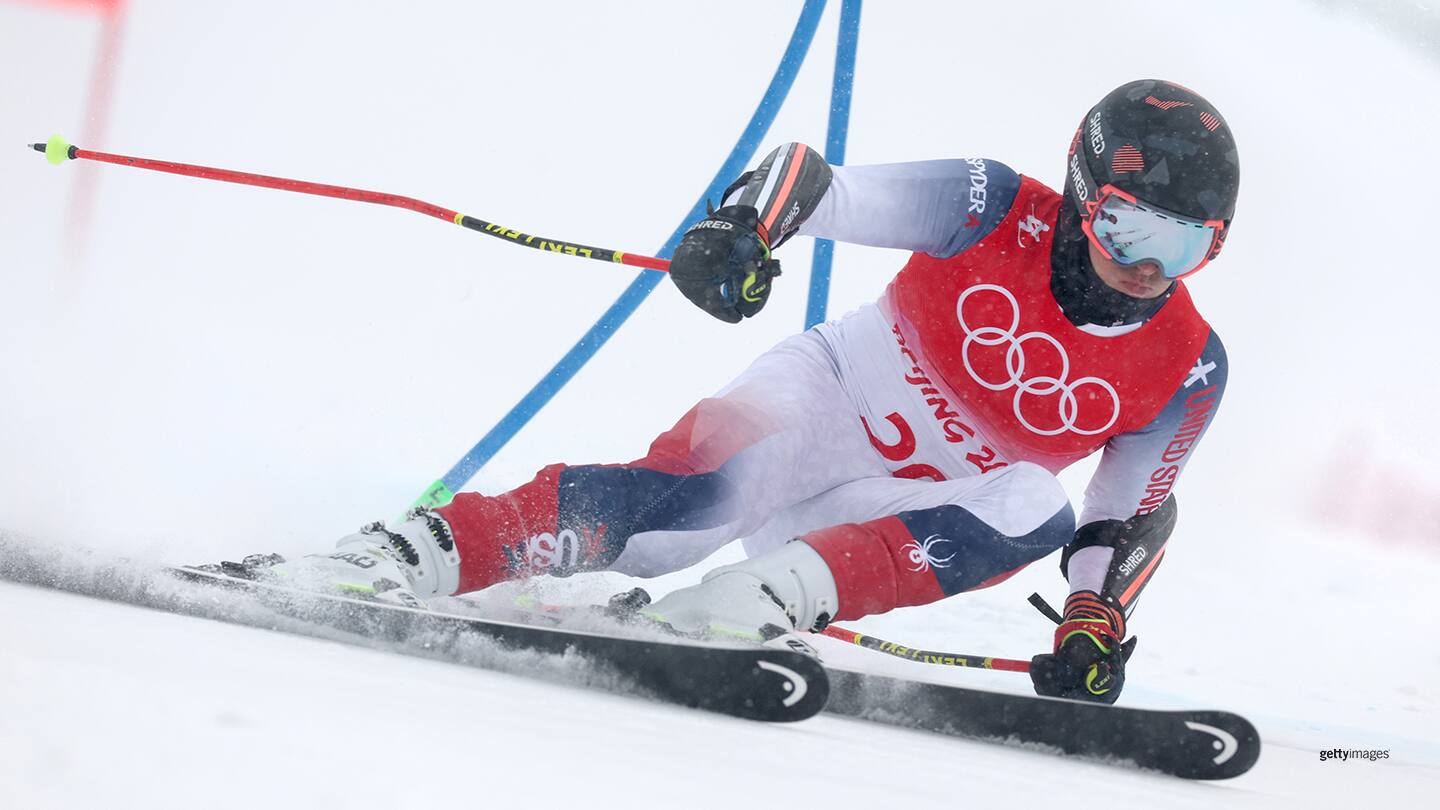
Back From Injury, Tommy Ford’s First Races Are At Winter Olympics
by Peggy Shinn

Tommy Ford reacts following his run during the second men's giant slalom run during the Olympic Winter Games Beijing 2022 on Feb. 13, 2022 in Yanqing, China.
BEIJING — For Tommy Ford, just standing in an Olympic starting gate was a victory. The 32-year-old alpine skier had not raced in over a year. And here he was at the Olympic Winter Games Beijing 2022.
Once on course, it was “like riding a bike,” he said of his giant slalom runs earlier this week.
“I felt comfortable and ready to charge a victory,” he said after finishing 12th in in the Olympic GS, his best result in three Olympic Games. “I have been working to get back, but it's also a continuity from where I was last time [I raced], so it's not totally different.”
“I'm really grateful to be skiing and able to just be around this crew again,” he added.
Thirteen months ago, Tommy Ford did not know when he would ski again. A talented GS skier with three world cup podiums on his resume, he crashed badly near the finish of the Adelboden World Cup giant slalom, landing on his head, then sliding into the netting lining the course.
He tore two ligaments in his right knee and fractured the tibial plateau. It’s the type of injury orthopedic surgeons sometimes see after motorcycle accidents. Ford also tore ligaments in his left wrist and was also contending with concussion symptoms.
Back home, doctors at The Steadman Clinic in Vail, Colorado, repaired his knee. Then Ford began the long rehab process. The 2022 Olympic Winter Games were a long way away. But at the same time, they were not. When he crashed in Adelboden, Ford was ranked fourth in the giant slalom world cup standings, with a win on his resume. Would he make his third U.S. Olympic team?

Tommy Ford skis during the second men's giant slalom run during the Olympic Winter Games Beijing 2022 on Feb. 13, 2022 in Yanqing, China.
Background #
Ford is no stranger to injuries. He grew up on the slopes of Mt. Bachelor in Bend, Oregon, with his dad an alpine ski coach there. Ford had a promising junior career, winning a silver medal in slalom at the 2009 junior world championships. A year later, when he was 20, he was named to his first U.S. Olympic Team. He finished 26th in GS at the 2010 Vancouver Olympic Winter Games and over the next two seasons, finished consistently in the world cup points.
In 2012, he injured his right hip while training in New Zealand. But this injury was a quick blip — at least on paper. He had surgery in September, was back on snow in November and a month later, in the starting gate of the Beaver Creek World Cup GS in Colorado, where he again scored points.
But his recovery did not last long. In January 2013 while backcountry skiing in France, Ford broke his femur. He had emergency surgery in France, then missed the remainder of the 2012/13 season, as well as the entire 2013/14 year, including the 2014 Olympic Winter Games.
Back racing in December 2014, Ford again worked his way up the world cup rankings, making the 2018 U.S. Olympic Team and finishing 20th in the GS. Teammate Ted Ligety won the Olympic gold medal the GS that year.
By December 2019, Ford broke through at the Beaver Creek World Cup. In front of a home crowd, he won the GS, beating then-world-cup-GS-leader Henrik Kristoffersen (Norway). He ended the season ranked fifth in GS.
Ford came in hot to the 2020/2021 world cup season, finishing top 10 in four GSs and moving up to fourth in the world in GS.
But on January 9, while racing the second of two world cups in Adelboden, Switzerland, Ford crashed hard three gates from the finish. He remembers nothing from the crash or the hours surrounding it, and he did not watch a video replay until recently.
“It took a while for me to come around to [watching it],” he said. “It was just hard to see that and know that loved ones watched it.”
Ford worked through months of rehab — even playing Mario Kart last summer (and in the Olympic Village during the 2022 Winter Games).
“If you're not gonna ski, you can work on your skiing by playing Mario Kart from the couch,” he joked.
He has a bulge on his left knee from a bolt holding his tibial plateau together. And he had to relearn how to use his hamstring muscle. The ligament holding it to the knee was torn and needed four months to heal.
“It's been tricky, and I still have issues with that,” he said. “I do rehab every day, working out a lot. I still have a lot of work to do. I'm wearing a knee brace whenever I ski, so it's just a new part I'm getting used to.”
Recovering from the concussion was perhaps the hardest part of his journey in the past year. After the crash, he struggled with his eyes and vision, and had mood swings.
“The head is slow and weird because I feel normal most of the time then, oh, wait, maybe I'm not normal,” he said.
His girlfriend, Olympian Laurenne Ross, helped him recover, “showing me a good work ethic,” he said. “She's just given me her love regardless of what happens.”
Even with all the support, Ford struggled with an emotional rollercoaster.
“It's been in waves,” he said. “I wasn't in dumps the whole time. I’d go up and down, and it’s continued all the way until these Games. I'm feeling good now and just continuing to be aware of where I’m at.”
Ford returned to skiing in November 2021 and was happy to be back doing the sport that has brought him joy. He was training fast again by January, even forerunning a race in Vail. But he did not actually race until the 2022 Olympic GS. The closest that he had come to race pace was the day before, he said, half-joking.
His first run was “pretty scary,” he admitted (in finished 19th that run). But second run, he charged, skiing the seventh fastest of anyone in the second run and moving into 12th.
“He's been a mentor of mine since I joined the world cup team many years ago,” said River Radamus, who finished fourth in the 2022 Olympic GS. “Seeing what a skier he is and everything he's gone through in the last year, to come back here, I'm really glad to be able to share this with him.”
Ryan Cochran-Siegle, who won the Olympic silver medal in super-G last week,and also raced the GS (but skied out first run), appreciates having Ford’s leadership back on the team.
“Having the heart to come back, especially with what his injury was, means so much to our team,” said Cochran-Siegle. “He's the type of leader that we all respect, and we definitely want him back 100 percent and racing for those podiums, those wins.”
Ford will race the alpine team event on Saturday, then will head to Slovenia for the next world cup GS in mid-March.
“There's part of me that knows I can win a medal here,” he said. “I'm just happy to be alive and skiing and out here.”
Peggy Shinn #
An award-winning freelance writer based in Vermont, Peggy Shinn is in Beijing covering her seventh Olympic Games. She has contributed to TeamUSA.org since its inception in 2008.